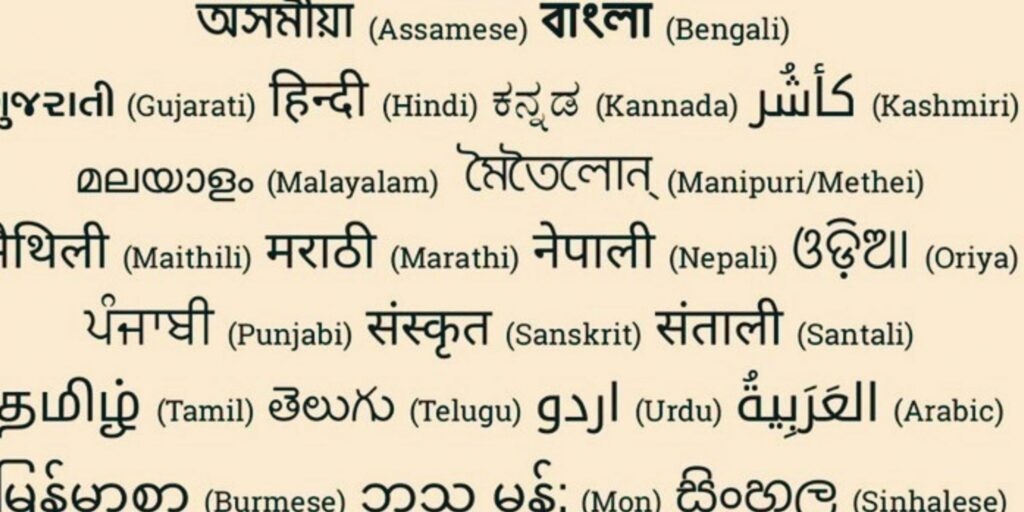Physical Address
304 North Cardinal St.
Dorchester Center, MA 02124
Physical Address
304 North Cardinal St.
Dorchester Center, MA 02124

Learning is a process that all living—human and non-human—beings follow from day one. Learning a new language is all the more difficult.
Our brain is accustomed to grasping things right from a tender age, especially those that instantly pique our interest. The importance of learning for every individual is crucial to his/her success in life. A passion for learning has produced countless Nobel laureates
Learning a new language is an easy and difficult task. When people have an interest in skills, it festers into passion, which in turn makes you dedicated and committed to achieving your goals at any cost.
We’re living in an interconnected world. India is the nation of 122 languages that serves the distinction of being the most multilingual country in the world. Trying out a new Indian language is in itself a gateway to new cultures of all regions.

It takes 6 months at most to learn a new language if you’re learning it with patience, focus, and dedication. Our focus will be on Indian languages, where non-Indian ones will pop up as well due to their significance to Indians.
English is renowned for its universality, French has a poetic flow, Spanish involves linguistic intricacies, Italian has twisters where you roll your tongue often, and many more.
Learning a new language(s) is quite interesting, its benefits notwithstanding. It is a fascinating experience when you’re trying to speak and pronounce different words/sentences, fail comically in the initial stages, and start all over.
Some important benefits are as follows:
Learning a new language has a profound impact on your brain, as numerous studies prove that bilingualism enhances cognitive functions where you become better at multitasking, creativity & innovation, and problem-solving, among others.
While grasping the intricacies of the new language, you challenge your brain to recognize, negotiate, and communicate with various linguistic structures, which, when practiced regularly, sharpen your mental faculties.
Bilingual people often display sharper memory, attention-span, and concentration compared to monolinguals. This cognitive flexibility stems from the constant practice of switching between languages, which keeps the brain agile and resilient.
The competition in the job market has reached astronomical heights where being bilingual or multilingual is a huge plus point. People that are wary of learning a new language may need to pull up their socks and take the plunge to avail more professional opportunities, both domestic and international.
Most employers place significant value over language skills as they not only highlight your communication skills across various cultures but also your willingness to experiment with diverse perspectives.
Multilingualism is useful in numerous fields like international business, tourism, diplomacy, and translation, where language skills directly influence job performance. Many global companies want employees who can bridge communication gaps between teams in different countries; another reason why learning a new language is an art that can promise financial benefits.
Different cultures are easy to understand and accept wholeheartedly when you learn a new language, thereby making new friends, relationships, and life-changing experiences. While speaking to someone in their native language, you’re not only communicating words but also conveying interest and respect in their culture.
This ability to connect with people from a different ethnicity at a deeper level fosters empathy and understanding in an increasingly globalized world. Travel becomes a richer experience when you speak the local language, allowing you to navigate more confidently and engage with people in meaningful ways.
Learning a new language bridges cultural gaps in a big way
While all the languages have the culture and flavor of the countries they originate from, there is nothing to match India’s linguistic landscape. It is the most diverse and fascinating in the world, where with 22 officially recognized languages and hundreds of dialects, Indian languages offer a unique window into the country’s rich cultural heritage.
Cultural Diversity: Each Indian language is deeply intertwined with its region’s history, art, literature, and philosophy.
The mother of many Indian languages is Sanskrit that is a medium for ancient scriptures, philosophical texts, and scientific breakthroughs. Similarly, Tamil is one of the oldest classical languages on the planet dating back to many millennia.
Linguistic Beauty & Complexity: The diversity aside, Indian languages are replete with intricate grammar, rich scripts, and expressive vocabulary. For example, some of the most influential writers and poets in modern literature speak Hindi and Bengali.
Similarly, Telugu and Kannada have poetic expression and musicality that have richly shaped the cultural aspects of Southern India. Coming to scripts, Hindi & Marathi are written in Devanagari, Malayalam script has an elegance, all of which make Indian languages an art form with visual and aesthetic dimensions.
Multilingualism as a Norm: Multilingualism is not an exception but a norm in India. Many Indians grow up speaking multiple languages, effortlessly switching between them depending on the region and context. Hindi & English are the most spoken languages in the country that everyone understands.
This linguistic flexibility is a testament to how adaptable and inclusive Indian culture is. Learning an Indian language allows one to experience this unique linguistic environment firsthand.
Those readers who’re ready to dive in, choosing languages like French, German, & Spanish, can unlock lucrative opportunities globally. However, you can’t overlook the beauty and depth of Indian languages, which offer a profound connection to one of the world’s oldest and most diverse cultures.
The phrase ‘learning a new language’ has a hidden meaning